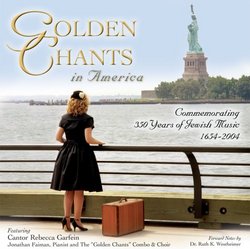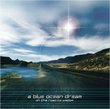| All Artists: Golden Chants Combo and Choir Title: Golden Chants in America...Commemorating 350 Years of Jewish Music Members Wishing: 1 Total Copies: 0 Label: Bari Productions, Inc. Original Release Date: 11/10/2005 Release Date: 11/10/2005 Genre: International Music Style: Number of Discs: 1 SwapaCD Credits: 1 UPC: 672279165423 |
Search - Golden Chants Combo and Choir :: Golden Chants in America...Commemorating 350 Years of Jewish Music
 | Golden Chants Combo and Choir Golden Chants in America...Commemorating 350 Years of Jewish Music Genre: International Music
BRAND NEW RELEASE!!! — Album debuted at New York City's Carnegie Hall on November 10, 2005. — "Golden Chants in America...Commemorating 350 years of Jewish Music, 1654-2004," which includes music from the Spanish-Portuguese... more » |
Larger Image |
CD DetailsSynopsis
Album Description BRAND NEW RELEASE!!! Album debuted at New York City's Carnegie Hall on November 10, 2005. "Golden Chants in America...Commemorating 350 years of Jewish Music, 1654-2004," which includes music from the Spanish-Portuguese Jews, the synagogue and the Yiddish and Broadway theater, is the CD is the first U.S. recording to feature Jewish music spanning 350 years of life in America. The historic album includes forward liner notes by acclaimed therapist and author of, "Musically Speaking," Dr. Ruth K. Westheimer. Featuring Music in Six Languages The album features compositions sung in a virtual rainbow of languages, including Spanish, Ladino (Judeo-Spanish), German, Yiddish, Hebrew and English--much of which was brought to America by the Spanish-Portuguese, Russian and German Jews over the last 350 years. Album selections include "Bendigamos," a Spanish-Portuguese Jewish grace after meals sung in 16th century Castilian Spanish; and "Halleluyah," and the "Deutsche Kedusha," the great music of Vienna and Berlin written for the synagogue by Salomon Sulzer and Louis Lewandowski, respectively. To this day, most American Reform and many Conservative and Orthodox congregations continue to utilize Sulzer's "Shema" and Lewandowski's "Kiddush" in their services. Other album highlights feature Yiddish and Broadway music, including "Vos is gevorn fun mayn Shtetele?" (What has become of my Shtetl?), "Bei Mir Bist Du Schoen," and Jerome Kern's "Can't Help Lovin' that Man," from the 1927 musical, "Show Boat." The CD pays tribute to several of the modern Jewish composers, including Cantor Robbie Solomon, who has written extensively for the American synagogue. His gospel-style "Peace by Piece," embodies a universal anthem that expresses commitment to social action and the ultimate goal of peace. Cantor Garfein demonstrates how modern interpretations of ancient prayer melodies have been influenced by contemporary American harmonies with selections of "Yih'yu L'ratson" and "Oseh Shalom" (prayers for meditation and peace), by composer Cantor Marshall Portnoy. Similar CDs
|
CD ReviewsCantor Garfein does it again! Jerrold S. Cooper | Baltimore, MD USA | 12/17/2005 (5 out of 5 stars) "A wonderful potpourri of Jewish music in America. Despite the broad range--art song, cantorials, Ladino folk-devotional, Yiddish theater, Broadway show tune, patriotic anthem--Garfein modulates her sweet-but-strong voice to make every genre her own. The real treats include Max Helfman's gorgeous setting of Emma Lazarus's "New Colossus," a rousing Hebrew-Ladino "Ein Keloheinu," a very sexy "Bei mir bist du shayn," and a lump-in-your-throat yet neither corny nor cloying "God Bless America." A beautiful voice that I could listen to forever, and a keen instinct for musical style and expression." Wonderful! Sharon Blumenstock | Boston, MA USA | 11/22/2005 (5 out of 5 stars) "This CD is wonderful. It is filled with different kinds of music , from different periods of time, in different languages, all of which are sung magnificently by Cantor Garfein. Her voice is amazing and the CD is so enjoyable to listen to. This album is fun and yet spiritual all at the same time. I highly recommend this CD-- a must have in everyone's collection."
|

 Track Listings (14) - Disc #1
Track Listings (14) - Disc #1
